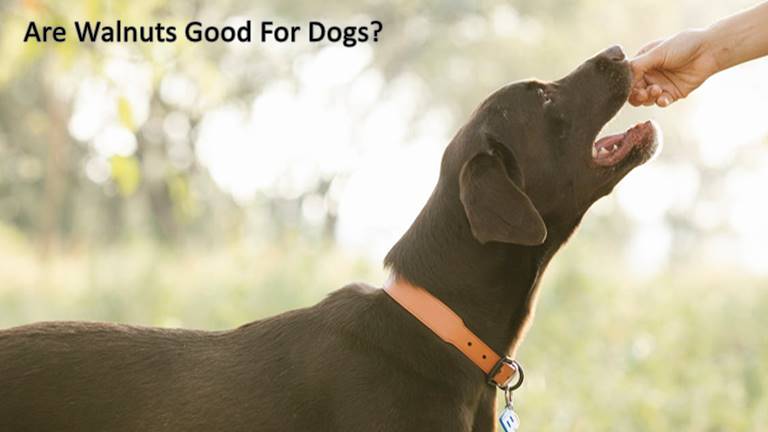As a dog lover and expert, one common question I often come across is whether walnuts are safe and beneficial for dogs. While walnuts offer several health benefits for humans, it’s crucial to understand the potential risks they pose to the dogs. In this article, we’ll explore the topic comprehensively and provide you with all the necessary information to make an informed decision about including walnuts in your dog’s diet.
Are Walnuts Good For Dogs?
No, walnuts are not good for dogs. While walnuts are nutritious for humans, they can be harmful to dogs. Walnuts are high in fat, which can lead to digestive issues and even pancreatitis in dogs. The high fiber content can also cause gastrointestinal discomfort. Furthermore, some walnuts may contain toxins, and their hardness poses a choking hazard for dogs. It is best to avoid feeding walnuts to dogs and opt for dog-specific treats or other safe alternatives.
Understanding the Nutritional Composition of Walnuts
When considering the suitability of any food for dogs, it’s important to analyze its nutritional profile. Walnuts are known for their rich content of omega-3 fatty acids, protein, fiber, vitamins, and minerals. While these components are beneficial for humans, dogs have different dietary requirements.
Potential Risks of Walnuts for Dogs
Despite the nutritional value walnuts offer, there are several reasons why they are not recommended for dogs:
a. High Fat Content
Walnuts contain a significant amount of fat, which can lead to digestive issues and even pancreatitis in dogs. Excessive fat intake can cause stomachaches, diarrhea, vomiting, and potential long-term health problems.
b. Digestive Challenges
Dogs have a different digestive system than humans, and the high fiber content in walnuts can be hard for them to process, leading to gastrointestinal distress and discomfort.
c. Presence of Toxins
Walnuts, especially those that are moldy, may contain mycotoxins, which can be harmful to dogs. Ingesting moldy walnuts can result in neurological symptoms, including tremors and seizures.
d. Choking Hazard
Due to their hardness, walnuts pose a choking risk for dogs, especially if they attempt to swallow them whole.
Safe Alternatives to Walnuts for Dogs
While walnuts are not suitable for dogs, there are plenty of delicious alternatives that offer both flavor and nutritional benefits. In this article, we will explore several safe alternatives to walnuts that you can incorporate into your dog’s diet, ensuring their well-being and satisfaction.
Almonds
Almonds are packed with vitamin E, magnesium, and riboflavin (vitamin B2). While almond butter can be given to dogs, it’s important to note that not all dogs can digest it easily. It’s best to limit almond consumption to small amounts, ensuring it’s a suitable option for your dog’s digestive system.
Pumpkin Seeds
Pumpkin seeds offer natural deworming properties and are rich in manganese, vitamin K, zinc, and phosphorus. They can be a nutritious and tasty addition to your dog’s diet. You can offer them as a standalone treat or sprinkle them over their food for added health benefits.
Sesame Seeds
Sesame seeds are a powerhouse of nutrients, including zinc, selenium, copper, iron, vitamin B6, and vitamin E. These nutrients support the immune system and contribute to overall well-being. Sesame seeds also provide calcium and magnesium, which are essential for maintaining healthy bones and muscles in dogs.
Chia Seeds
Chia seeds are an excellent source of fiber, protein, calcium, iron, and magnesium. They are also high in omega-3 fatty acids, providing additional benefits for your dog’s overall well-being. Consider adding chia seeds to your dog’s meals by sprinkling a small amount on their food.
Sunflower Seeds
Sunflower seeds are packed with vitamin E, selenium, niacin, B vitamins, fiber, protein, and iron. When feeding sunflower seeds to your dog, ensure they are shelled, raw, and unsalted. Alternatively, you can offer sunflower seed butter as a tasty and nutritious treat.
Hemp Seeds
Hemp seeds are easily digestible and offer numerous health benefits for dogs. They are rich in antioxidants, high in protein, and provide a healthy balance of omega-3 and omega-6 fatty acids. Hemp seeds also contain essential minerals such as phosphorus, magnesium, manganese, iron, zinc, potassium, copper, as well as vitamins E and B.
Cashews
Cashews contain heart-healthy fats, along with copper, magnesium, and manganese. Due to their higher fat content, it’s important to feed cashews in moderation. A good guideline is to provide around 3-4 cashews or 1 teaspoon for a 20-pound dog, and about a handful or 1 tablespoon of cashew butter for a 50-60 pound dog.
Wrap Up
As we have discussed, walnuts are not good for dogs, despite being considered a healthy and nutritious choice for humans. The high fat content, potential digestive challenges, presence of toxins, and choking hazard make walnuts a risky choice for our canine companions. However, there are plenty of safe alternatives that can provide both flavor and nutritional benefits to your dog’s diet.
Consider incorporating almonds, pumpkin seeds, sesame seeds, chia seeds, sunflower seeds, hemp seeds, and cashews as alternatives to walnuts. These alternatives offer a range of vitamins, minerals, and other essential nutrients that can support your dog’s overall health and well-being. Remember to introduce new foods gradually and in moderation, observing your dog’s response.
As a responsible dog owner, always consult with your veterinarian before making any significant changes to your dog’s diet. They can provide personalized guidance based on your dog’s specific needs, health conditions, and any potential allergies. By making informed choices and opting for safe alternatives, you can ensure that your beloved furry friend receives a healthy and balanced diet while avoiding any potential risks associated with walnuts.
What are the symptoms of walnut poisoning in dogs?
If you suspect that your dog has ingested walnuts or is displaying any of these symptoms, it is crucial to seek immediate veterinary attention to ensure appropriate diagnosis and treatment. Prompt veterinary care can help mitigate the potential risks and provide the best chances for a positive outcome for your dog.
What to do if my dog ate walnuts?
Assess the situation: Determine the amount of walnuts your dog has ingested and whether they were raw, roasted, salted, or moldy. This information will be helpful for the veterinarian to evaluate the potential risks.
Contact your veterinarian: Call your veterinarian immediately and inform them about the situation. Provide details about the quantity of walnuts consumed, the type of walnuts, and any symptoms your dog is experiencing.
Follow the veterinarian’s advice: Your veterinarian will provide guidance based on your dog’s specific situation. They may instruct you to monitor your dog at home, induce vomiting (if ingestion occurred recently and it is safe to do so), or bring your dog in for an examination.
Do not induce vomiting without professional guidance: Inducing vomiting should only be done under veterinary supervision. In some cases, inducing vomiting may be contraindicated or unsafe, depending on the type of walnuts consumed or the time elapsed since ingestion.
Observe your dog: Keep a close eye on your dog for any changes in behavior, appetite, or the onset of symptoms. Take note of any abnormal signs, such as vomiting, diarrhea, lethargy, tremors, or difficulty breathing.
Prevent access to walnuts: Ensure that your dog cannot access any more walnuts or walnut-containing products. Store them securely and out of your dog’s reach to avoid further ingestion.
Remember, every situation is unique, and professional veterinary advice is crucial in cases of walnut ingestion. By promptly seeking veterinary assistance, you can ensure that your dog receives appropriate care and minimize potential risks to their health.


